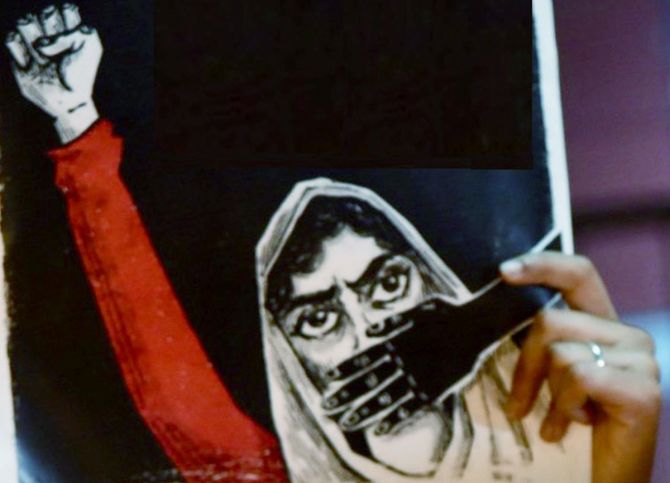A total of 326 cases were registered in the country under the controversial colonial era law of sedition between 2014 and 2019 in which just six persons were convicted.

According to the Union home ministry data, a total of 326 cases were registered under the sedition law -- the highest, 54, in Assam -- between 2014 and 2019.
Out of the cases registered, chargesheets were filed in 141 cases while only six people were convicted for the offence in six years of the period discussed in the data, officials said.
In Assam, out of the 54 sedition cases registered, chargesheets were filed in 26 cases and trials were completed in 25 cases.
However, not a single case led to conviction between 2014 and 2019, the data says.
Jharkhand registered 40 cases under the Section 124 (A) during the six years, out of which chargesheets were filed in 29 cases, and trials were completed in 16 cases. Only one person was convicted out of all these cases filed in the state.
In Haryana, 31 cases were registered under the sedition law with chargesheets filed in 19 cases, and trials completed in six cases. Here too, only one person was convicted.
Bihar, Jammu and Kashmir, and Kerala registered an equal number of cases, 25, under the sedition law.
While Bihar and Kerala could not file chargesheet in any of the cases, Jammu and Kashmir filed it in three cases. However, no such case registered in the three states between 2014 and 2019 led to conviction.
Twenty-two sedition cases were filed in Karnataka with chargesheets filed in 17 cases, but trial could be completed in only one case. The state too had zero conviction under sedition law in six years.
Seventeen sedition cases were filed in Uttar Pradesh and eight in West Bengal between 2014 and 2019.
While chargesheets were filed in eight cases in UP and in five cases in West Bengal, no one was convicted in the two states.
In Delhi, four sedition cases were registered between 2014 and 2019, no chargesheet has been filed in any case, nor has anyone been convicted.
No sedition case was filed in Meghalaya, Mizoram, Tripura, Sikkim, Andaman and Nicobar Islands, Lakshadweep, Puducherry, Chandigarh, Daman and Diu, and Dadra and Nagar Haveli in the six-year period.
One sedition case each was filed in Maharashtra (in 2015), Punjab (2015), and Uttarakhand (2017).
According to the home ministry data, 2019 saw the highest, 93, sedition cases registered in the country.
In 2018, there were filed 70 such cases, followed by 51 in 2017, 47 in 2014, 35 in 2016, and 30 in 2015.
Four chargesheets were filed in the country in 2019 under the sedition law, 38 in 2018, 27 in 2017, 16 in 2016, 14 in 2014, and six in 2015.
Among the six convicted, two got sentenced in 2018 and one each in 2019, 2017, 2016, and 2014.
The Centre on Monday told the Supreme Court not to invest time in examining the validity of sedition law as it has decided to go for re-consideration of the provisions by a competent forum.
The Centre also said it was cognisant of various views and concerns about civil liberties while being committed to protecting the sovereignty and integrity of this great nation.
The ministry of home affairs, in an affidavit, referred to the views of Prime Minister Narendra Modi on shedding the colonial baggage and said he has been in favour of the protection of civil liberties and respect of human rights, and in that spirit, has scrapped over 1,500 outdated laws and over 25,000 compliance burdens.
On July 15, 2021, concerned over "enormous misuse" of the colonial era penal law on sedition, the Supreme Court had asked the Centre why it was not repealing the provision used by the British to "silence" people like Mahatma Gandhi to suppress freedom movement.
Agreeing to examine the pleas filed by the Editors Guild of India and a former major general, challenging the constitutionality of Section 124A (sedition) in the IPC, a bench headed by the then Chief Justice N V Ramana had said its main concern was the "misuse of law" leading to rise in number of cases.
The non-bailable provision makes any speech or expression that brings or attempts to bring into hatred or contempt or excites or attempts to excite disaffection towards the government established by law in India a criminal offence punishable with a maximum sentence of life imprisonment.











 © 2025
© 2025